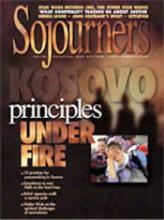From almost the beginning to the very end of the Book of Genesis, one theme whirls through many variations: war and peace between brothers (and one pair of sisters).
The war between Cain and Abel is the first event outside Eden, the first event of "normal" human history. Why? Why do humans turn to killing when they leave the Garden of Delight? Abel, the second-born child whose name means "Puff of Breath," and Cain, the first-born whose name means "Possessive," bring offerings to God—the fruit of their labor in field and pasture. Abel's offering is accepted, Cain's is rejected.
Cain is angry—what else would you expect? But he says nothing. God speaks the first word: "Why are you glowering?" God waits. There is no answer. Instead Cain tries to turn his flaming face away, lest it betray his anger. God tries again: "Why has your face fallen? If you intend good, lift it up!"
If we think of Cain and Abel as our own children, we might imagine ourselves as parents asking them these questions: "Look at me! Talk to me! Answer me!"
Cain still gives no answer. Hearing none, God continues, "If you do not intend good, sin crouches at the door. Its urge is toward you, but you can rule over it." Cain gives no answer to God. Instead he speaks to Abel, to his brother.
Kills him.
Wait. Cain seems to speak to Abel, but the text is very strange: "Cain said to his brother Abel...." What? What did Cain say? In most such passages of Torah, what follows these words is a quotation, a saying. Just above, the same words about God "saying" to Cain are followed by what God said.
But here there are no words, there is no quotation. Some contemporary translations leave an empty space, three dots, a silence. No more can Cain speak to Abel than to God. So the story continues, wordless. "So it was through their being in the fields that Cain rose up against his brother Abel and killed him."
Read the Full Article

